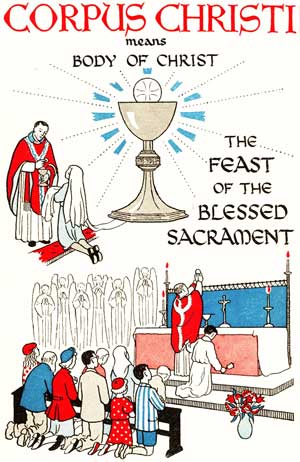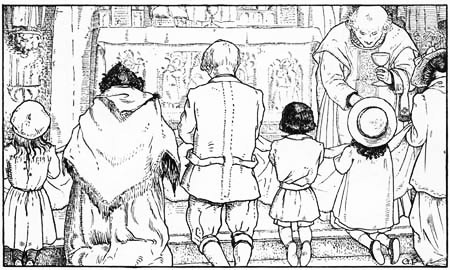Hallo again to all.
 Today many Anglicans in many places celebrated Corpus Christi—the late medieval 'Feast of the Body and Blood of Our Lord Jesus Christ', to use its official name. (Some of us also kept it this past Thursday.) There are complex reasons for the emergence of this feast in northern Europe in the thirteenth century, but they needn't concern us here. The feast is one of the most joyous of the year, kept with parades (what else can one call a procession with canopies and bagpipes?), undercroft-and-garden parties, and the best music one can muster—we've never heard more tremendous renditions of Stucky Coles' Ye Who Own the Faith of Jesus, or Mascagni's Regina Coeli from Cavalleria rusticana than we have on Corpus Christi.* Today many Anglicans in many places celebrated Corpus Christi—the late medieval 'Feast of the Body and Blood of Our Lord Jesus Christ', to use its official name. (Some of us also kept it this past Thursday.) There are complex reasons for the emergence of this feast in northern Europe in the thirteenth century, but they needn't concern us here. The feast is one of the most joyous of the year, kept with parades (what else can one call a procession with canopies and bagpipes?), undercroft-and-garden parties, and the best music one can muster—we've never heard more tremendous renditions of Stucky Coles' Ye Who Own the Faith of Jesus, or Mascagni's Regina Coeli from Cavalleria rusticana than we have on Corpus Christi.*
Corpus Christi is among the most exuberant of the days on the church calendar because it celebrates one of God's greatest and best gifts to us: the Holy Communion. Corpus Christi is the Church's emphatic Yes to Jesus' simple command Do this. About this simple imperative, Do this, Gregory Dix wrote what we believe is one of the most beautiful of all paragraphs in the English language:
Was ever a command so obeyed? For century after century, spreading slowly to every continent and country and among every race on earth, this action has been done, in every conceivable circumstance, for every conceivable human need from infancy and before it to extreme old age and after it, from the pinnacles of human greatness to the refuge of fugitives in the caves and dens of the earth. Men have found no better thing than this to do for kings at their crowning and for criminals going to the scaffold; for armies in triumph or for a bride and bridegroom in a little country church; for the proclamation of a dogma or for a good crop of wheat; for the wisdom of the Parliament of a mighty nation or for a sick old woman afraid to die; for a schoolboy sitting an examination or for Columbus setting out to discover America; for the famine of whole provinces or for the soul of a dead lover; in thankfulness because my father did not die of pneumonia; for a village headman much tempted to return to fetich because the yams had failed; because the Turk was at the gates of Vienna; for the repentance of Margaret; for the settlement of a strike; for a son for a barren woman; for Captain so-and-so, wounded and prisoner-of-war; while the lions roared in the nearby amphitheatre; on the beach at Dunkirk; while the hiss of scythes in the thick June grass came faintly through the windows of the church; tremulously, by an old monk on the fiftieth anniversary of his vows; furtively, by an exiled bishop who had hewn timber all day in a prison camp near Murmansk; gorgeously, for the canonisation of S. Joan of Arc—one could fill many pages with the reasons why men have done this, and not tell a hundredth part of them. And best of all, week by week and month by month, on a hundred thousand successive Sundays, faithfully, unfailingly, across all the parishes of Christendom, the pastors have done this just to make the plebs sancta Dei—the holy common people of God.**
Dom Gregory's ekphrasis has been maligned as 'the Purple Paragraph', but it moves us without fail to a deeper emotional, intellectual and spiritual understanding of how central—how different in form and essentially identical in substance—the celebration of holy communion has been throughout Christian history. It moves us to see ourselves in this grand sweep of persons who have been fed by God with Love in the sacrament of the Holy Eucharist. It moves us to want to eat that Love who is the eucharistic gift, and so to become ourselves more what we eat.
 In heart and mind, we went today with a priest-friend who carried the Blessed Sacrament to a sick parishioner's home. In that house, In heart and mind, we went today with a priest-friend who carried the Blessed Sacrament to a sick parishioner's home. In that house,
where Christ the Lamb, doth reign,
within whose foursquare walls shall come
no night, nor need, nor pain,
and where the tears are wiped from eyes
that shall not weep again
he brought from the altar of her parish church the simplest of meals and best of medicines. Behind a threshold where sense and intellect may not pass, the fruit of the earth, transformed by the work of human hands, transfigured by prayer, and accompanied by caring presence, was received with thanksgiving and rendered into praise. By this plain celebration, the Body of Christ became afresh the Body of Christ—our friend's arms his strong arms, our friend's suffering made perfect in his, our separation in space overcome by the unity of the sacrament.
Our Corpus Christi was this simple home communion, redolent to be sure with the memories of parades and Mascagni, Tantum ergo, O Salutaris Hostia, and Champagne in a garden, but stripped down to its Upper Room core: strength for the journey, shared among friends, given freely, accepted unreservedly, the material and Real Presence of Jesus Christ, born in us today. O come to us, abide with us, our Lord Emmanuel!
See you next week.

|

